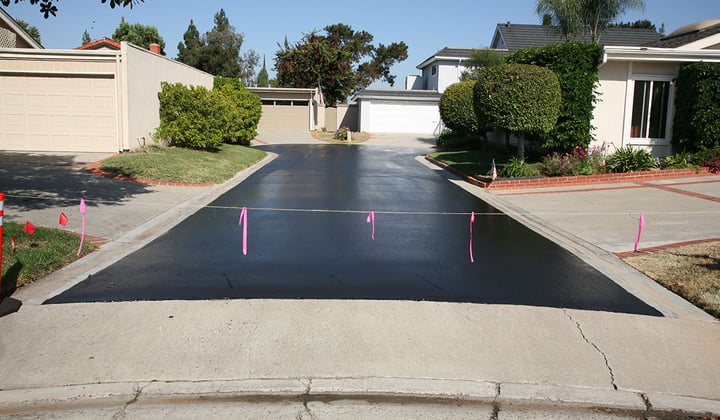Unleash the Possible: Regrading and Asphalt Sealing for Commercial Areas
Unleash the Possible: Regrading and Asphalt Sealing for Commercial Areas
Blog Article
Hot Mix Asphalt: A Lasting Service for Pavement
Warm Mix Asphalt (HMA) has arised as a leading lasting selection for sidewalk solutions, supplying a myriad of environmental benefits and innovative innovations. As the need for environment-friendly building and construction methods expands, checking out the nuances of HMA's sustainability can offer useful insights into the future of pavement solutions.
Ecological Advantages of Warm Mix Asphalt

Furthermore, Hot Mix Asphalt assists to minimize urban warm island effects. Its dark color absorbs sunlight, decreasing the quantity of heat mirrored back into the atmosphere compared to lighter-colored sidewalks. This can lower ambient temperature levels in metropolitan areas, decreasing the need for air conditioning and inevitably decreasing power usage.
Furthermore, Warm Mix Asphalt adds to improved stormwater management. Its porous nature allows water to infiltrate the sidewalk and charge groundwater materials, reducing drainage and the risk of flooding. These ecological benefits make Warm Mix Asphalt a sustainable selection for leading highways and roadways.
Power Performance in HMA Manufacturing
Is power effectiveness a vital consider the manufacturing of Warm Mix Asphalt (HMA)? Definitely. Energy plays a significant role in the manufacturing of HMA, affecting both cost and environmental sustainability. One vital element of energy effectiveness in HMA production is making use of warm mix asphalt (WMA) modern technologies (commercial parking lot paving). WMA enables the mixing and placement of asphalt at reduced temperature levels compared to conventional hot mix asphalt, leading to lowered energy intake during production. This procedure not just decreases gas usage however additionally decreases greenhouse gas discharges, making it a much more ecologically pleasant choice.
Additionally, innovations in plant innovations have actually caused more energy-efficient HMA production processes. Modern plants are created with features like recycled asphalt sidewalk (RAP) processing abilities, efficient heater systems, and enhanced insulation, all contributing to energy savings. By optimizing power use in HMA production, the market can reduce its carbon footprint while maintaining high-quality sidewalk materials. Power efficiency is, as a result, a crucial factor to consider in ensuring the sustainability of Warm Mix i was reading this Asphalt production.
Recyclability of Hot Mix Asphalt
The recyclability of Warm Mix Asphalt (HMA) is a pivotal aspect of its sustainability and lasting environmental impact. HMA is one of the most recycled materials in the United States, with over 100 million lots of redeemed asphalt sidewalk (RAP) being reused each year in brand-new pavement building and construction. Reusing HMA provides several environmental benefits, such as reducing the requirement for virgin products, helpful site decreasing power consumption during manufacturing, and reducing the quantity of waste sent out to garbage dumps.
The process of reusing HMA involves milling the existing sidewalk, squashing it right into smaller sized items, and blending it with brand-new accumulation and asphalt binder to develop a recycled mix. This recycled mix can frequently perform in addition to or also much better than standard HMA, while calling for fewer resources and creating lower greenhouse gas exhausts. By integrating RAP into new sidewalk projects, road agencies can save all-natural sources, lower costs, and minimize the environmental impact of roadway construction and maintenance activities. In general, the recyclability of HMA plays a considerable function in promoting lasting methods within the sidewalk market.

Long-Term Performance of HMA
Asphalt pavements show durability and durability over an extensive duration, wikipedia reference mirroring the long-lasting performance of Hot Mix Asphalt (HMA) In addition, developments in HMA innovation, such as the usage of polymer-modified binders and warm mix asphalt, have better improved the durability and durability of HMA sidewalks. By prioritizing high quality construction and upkeep practices, HMA continues to show itself as a sustainable and cost-effective option for lasting pavement framework.

HMA: Toughness and Sustainability
Demonstrating both resilience and sustainability, Warm Mix Asphalt (HMA) has become a keystone in the construction of lasting sidewalk frameworks - commercial parking lot paving. HMA's sturdiness originates from its ability to withstand hefty tons, severe weather condition conditions, and high traffic quantities, making it a reputable choice for highways, highways, and airport paths. The composition of HMA, which generally consists of aggregates, binder, and filler, plays an essential duty in enhancing its longevity and resistance to wear and tear
Additionally, HMA's sustainability hinges on its recyclability and energy-efficient production procedure. The ability to recycle redeemed asphalt pavement (RAP) in new HMA mixtures lowers the demand for virgin materials and decreases the environmental effect of sidewalk construction and maintenance. Furthermore, the energy effectiveness of generating HMA depends on its reduced mixing temperatures compared to other sidewalk materials, resulting in lowered power consumption and greenhouse gas discharges.
Final Thought
In final thought, hot mix asphalt (HMA) uses a sustainable remedy for sidewalk with its environmentally pleasant qualities. HMA's recyclability, energy efficiency in manufacturing, and long-term longevity make it a green choice for road construction.
HMA is one of the most recycled products in the United States, with over 100 million bunches of redeemed asphalt sidewalk (RAP) being recycled each year in brand-new pavement building.The process of reusing HMA includes crushing the existing sidewalk, crushing it right into smaller pieces, and blending it with new accumulation and asphalt binder to develop a recycled mix.Asphalt sidewalks demonstrate longevity and durability over an extensive duration, showing the long-term efficiency of Warm Mix Asphalt (HMA) In addition, improvements in HMA innovation, such as the use of polymer-modified binders and warm mix asphalt, have better improved the resilience and long life of HMA pavements. The capability to recycle reclaimed asphalt sidewalk (RAP) in brand-new HMA mixtures minimizes the need for virgin materials and lessens the environmental impact of sidewalk construction and maintenance.
Report this page